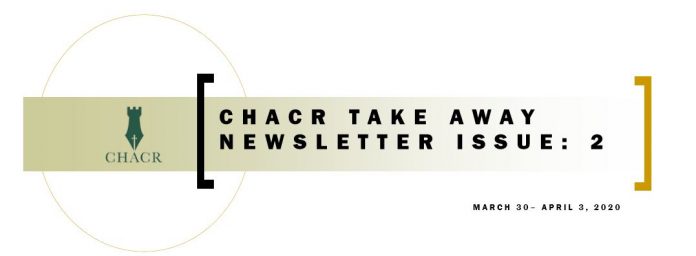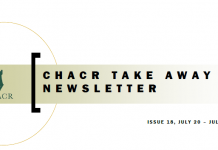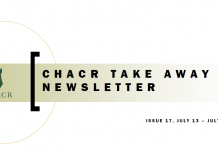This is the second issue of the weekly CHACR Take Away newsletter. In these newsletters, you will find links to the latest products by the CHACR, but also links to key reports and studies by external experts and institutions which we think you should pay attention to.
A Word from the Director The immediate focus of the Army, rightly, is on doing everything that it can to help the government and the NHS deal with the COVID avalanche that has hit the country and the world. That gives very little capacity for thinking about other things. Nevertheless, CGS has set up a team to think hard and long about what things will look and feel like once we are the other side of this pandemic. Early thinking, in broad terms, suggests that we will be confronted with two major post-COVID challenges, one shorter- and one longerterm. The first, short-term, challenge will be the inevitable effects of the pandemic on the Integrated Review. It will be delayed, but the bottom lines and questions in it will also look very different from those that Whitehall was asking itself only three months ago. Whitehall will have a very different bank balance as the population of Britain emerges blinking from the gloom of isolation and gathers together the remains of countless livelihoods and businesses. We have in the UK, over the last twenty or thirty years, developed an extraordinary mindset of ‘entitlement’, and, once COVID has receded, that sense, stoked no doubt by an aggressively questioning media, will demand that more and more of that empty bank account should go to those who now need help (i.e. almost everybody). Yet, at the same time, because humans always look at the immediate last problem and expect it to be retro-solved, there will be a public expectancy that the NHS will receive a lion’s share from the Treasury. The second, long term, challenge will be exacerbated by that first challenge, because the second big challenge will be that the Army will certainly have learned from this pandemic that Just-in-Time mindsets, that reliance on civilianisation and private logistic chains, that a neglect of reserves (both physical and human), and that a reliance on policies written by folk who believe that they can predict ahead and make ten-year plans that can foresee likely exact needs and take ‘calculated’ risks with ‘spare capacity’ simply isn’t wise. So the Army is going to have to continue to work out how to operate in the ongoing ‘constant competition’ of world affairs, while at the same time maintaining reserve capacity (one of those immutable Principles of War, after all) to step up to the mark without hesitation when contingent events demand – against a background of empty pockets in the Treasury. So, we are faced with a big problem right now; but once we’ve dealt with this one there is another big one, possibly a bigger one for the long-term health of the Army, heading down the tracks. Best that all spare thinking capacity is bent on getting ahead of that foreseeable problem….
Maj Gen (Ret) Dr Andrew Sharpe





